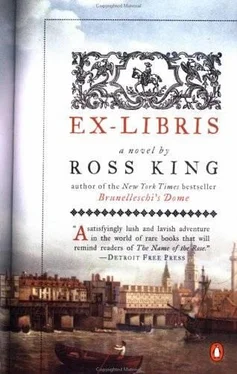'John Napier? I fear you've lost me. Was he not a mathematician?'
So he was, Biddulph admitted. A man of many parts, Napier was the first mathematician to make use of the decimal point, and in 1614 he made his greatest invention of all: logarithms. In those days, Biddulph explained, whole new worlds were opening up, not just in America and the South Seas, but in mathematics and astronomy as well. Men like Galileo and Kepler explored the heavens just as Magellan and Drake once explored the oceans. Through his telescope Galileo first saw the moons of Jupiter in 1610. By 1612 Kepler had counted 1,001 stars, over 200 more than Tycho Brahe. A few years earlier Kepler, a staunch Protestant, had interrupted his stargazing to calculate for Sir Walter Raleigh the most efficient method of stacking cannon-balls on a gundeck. This new science, Biddulph explained, went hand in glove with exploration and wars over both gold and religion. Mathematicians and astronomers were at the service of kings and emperors. In Scotland, fearful of another Spanish Armada, of a Catholic invasion of the island, Napier had composed complex plans for his 'secret inventions', one of which was a gigantic mirror that would use the heat of the sun to burn enemy ships in the Channel. His logarithms were soon employed as an aid to navigation by Edward Wright, a scholar at Cambridge, the author of Certaine Errors in Navigation detected and corrected .
'War had become a sophisticated art,' Biddulph explained, 'waged through mysterious numbers and complex geometries. As was navigation. Francis Bacon was designing plans for better and larger merchantmen-vessels of 1,100 tons, with keels 115 feet in length and mainsails 75 feet in width. He was also experimenting with new methods of ordering and disposing tiers of sails for quicker trips across the ocean. There were even stories that Bacon himself designed the Sidney , which might have been the case for all I know. Like most people in those days, he grovelled before Villiers. If Villiers wanted a ship, Bacon would certainly have designed one. And he sold Villiers his house in the Strand, York House, when Villiers took a fancy to it. It's where Villiers proposed to keep all of the books and paintings he had begun collecting.'
'So what are you saying?' I managed to interject. 'That the Philip Sidney was armed with… I don't know… with one of Napier's giant mirrors?'
I was beginning to wonder if Biddulph's mind was not perhaps slipping after all. But then I remembered that Edward Wright's Certaine Errors in Navigation had also been on the list of books missing from Pontifex Hall, one of the volumes taken from the library along with The Labyrinth of the World .
'Of course not,' he replied evenly. 'I am merely explaining how the Philip Sidney appeared to have been equipped for tasks other than prospecting for gold along the Orinoco.'
'Which meant…?'
'Which meant nothing much in itself, perhaps. As you say, there were plenty of dangers to be found on the high seas. It would have been folly not to carry as many cannons as possible. But to understand the true purpose of the Sidney 's voyage, you must understand how things stood in those days. I mean how things stood in both the Navy Office and the country at large.'
'Her true purpose?'
Biddulph paused. His eyes had closed and for a moment I thought he might have fallen asleep. I could feel myself begin to sweat and wheeze in the close little room. I was about to ask again, but his eyes suddenly opened and with a laborious grunt he pushed himself to his feet. The sleepy cat in the crook of his arm was blinking in the jaundiced beam of sunlight that had drifted round to the window.
'Yes. Her true purpose. But shall we take a short walk, Mr. Inchbold?' He was scratching the cat's ears and peering down at me, squinting in the pillar of light. 'I shall tell you all about it as we stroll. A perambulation, you see, sometimes refreshes a tired old brain.'
***
The tide had turned by the time we left the cottage, and most of the traffic in the Lower Pool was now bound for points downstream. Oars hissed and slapped in the water, canvas soughed in the breeze. We walked along the wharf in the direction of Shadwell, the sun warm on our shoulders. I had to struggle with my thorn-stick to keep up with Biddulph, who was spry as a goose. He slackened his pace only to pluck primroses from the water's edge, point out the odd landmark, or else to perform gallantries for the ladies of Wapping as they lumbered home from Smithfield Market with their suppers peeping from straw baskets. We walked as far as the Limehouse Stairs, almost a full mile. Only when we were returning to the cottage, squinting into the bright sun, did he resume his story.
The story, as Biddulph told it, seemed like one of the Revenge Plays so popular in the theatres of the time, something by John Webster or Thomas Kyd. There were court intrigues, shifting alliances, plots and counterplots, blood feuds, bribes both sexual and financial, even a poisoning-all performed with grisly relish by a cast of scheming bishops, sycophantic courtiers, Spanish spies and informers, corrupt officials, assassins, and a divorced countess with a spotted reputation.
Yes, I thought as we picked our way past the salt-glazed webs of fishermen's nets spread in the sun to dry: it would have made excellent theatre. On the one side was the War Party, led by the Archbishop of Canterbury, a staunch Calvinist spoiling for a war with the hated Spaniards. On the other was the Spanish Party, led by the aristocratic Howards, a family of wealthy crypto-Catholics who held sway over the King by means of their creature, a smooth-cheeked young Scotsman named Robert Carr, who had been created Earl of Somerset. Somerset was a spy for the Spaniards, turning over to Gondomar all correspondence between King James and his ambassadors. But in 1615 he had been disgraced when his new bride, a Howard, was accused of poisoning Sir Thomas Overbury, who opposed the marriage of the favourite to a woman whose infamy was remarkable even for those days. At a stroke both Gondomar and the Howards found themselves deprived of influence at court.
And it was at this point that a new character capered on to the stage, Sir George Villiers, another smooth-cheeked young man, who quickly replaced the imprisoned Somerset in the lecherous old King's affections. Villiers had been fostered and promoted by Archbishop Abbott, an inveterate enemy of the Howards. Among his numerous schemes the Archbishop planned to use Villiers to replace the Earl of Nottingham-yet another Howard-as Lord High Admiral. Once the hero of '88, Nottingham was by then a doddering octogenarian, the dupe of both his unscrupulous relatives and corrupt underlings in the Navy Office, to say nothing of the fact that he still received a handsome pension from the King of Spain.
'A new regime would begin with Villiers in the Navy Office,' Biddulph explained. 'No longer would our ships be the tools of the Howards and the Spanish Party. No longer would the Navy Office be a nest of thieves and informers, rotten with corruption from top to bottom. It would have a purpose once more. New and better ships would be built, and the Navy could begin to act as it had acted in the days of King Henry.'
But the situation was urgent, because at this point more characters began appearing on stage, couriers and messengers from all across Europe. All arrived at Lambeth Palace with enciphered papers and smuggled documents that brought dire news for the War Party. Not only had a Catholic League been formed in Germany to counteract the Protestant Union, but the Union itself was falling apart. It looked to the Abbott-Pembroke faction more and more as if the truce between the Dutch and Spaniards was about to be shattered by cannon-fire, as if new wars in the Low Countries were to be fought on the scarred old battlefields where Sidney gave his life thirty years earlier-wars for which England was neither ready nor, under James and the Spanish Party, willing. Worst of all, though, was a new report from Prague, delivered by a courier in red-and-gold De Quester livery, describing how a Habsburg, Ferdinand of Styria, was soon to be elected Holy Roman Emperor with the blessing of his cousin and brother-in-law, the King of Spain. Not only would Ferdinand use Spanish troops to restore Catholic magistracy anywhere in the Empire he might see fit, he would also revoke the Letter of Majesty granted by Rudolf II to the Protestants of Bohemia.
Читать дальше












